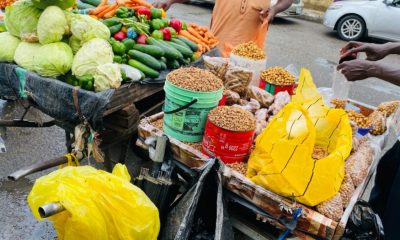Feature/OPED
Managing Rising Inflation in Nigeria

By Otori Emmanuel
No doubt, inflation is a barrier to the much a country can do in terms of value and wealth creation as it affects every aspect of its productivity. Tragically, this is currently the state of Nigeria where the purchasing power of the Naira declines day by day. This decline is not without effect on daily living – everything increases as the purchasing power decreases.
The Consumer Price Index (CPI) annual percentage change in value is known as inflation. It accurately gauges how much a portfolio of goods and services prices vary over the course of a year. The CPI for 2022 increased to 15.60 per cent (year-on-year) in January 2022, according to records from the National Bureau of Statistics (NBS). Based on the NBS, Nigeria’s inflation rate increased from 9.0 per cent in 2015 to 17.71 per cent as of May 2022 (year on year).
It is obvious that over the years, the value of money in Nigeria has been falling, thereby causing a negative impact. Usually, this inflation is expected to reduce purchasing power by 2 per cent or 3 per cent to bounce back to stability but it seems that the inflation in Nigeria has risen above 10 per cent.
In a state like this, Nigeria is gradually tilting into hyper-inflation, thereby reducing the value of the Naira. Over the past 10 years, Nigeria has long struggled with a general increase in the cost of food, goods, and other necessities as well as a decline in buying power which has barely retraced the market.
Inflation rates of 2 per cent to 3 per cent assist an economy because they stimulate consumers to take out more loans and make more expenditures because interest rates are also held at historically low levels at these levels.
How is Inflation caused?
Inflation is brought on by the following among others:
- Changes in the cost of production and distribution.
- An imbalance in the money supply and demand.
- An increase in the tax rate on goods.
As it is known, the value of money decreases when the economy undergoes inflation, which is an increase in the price of goods and services as a result, a given unit of currency now buys fewer products and services.
Implications of Inflation
According to data from the NBS, the economy made an improvement in 2022’s first quarter, as evidenced by a 3.1 per cent growth in Gross Domestic Product (GDP). Both individuals and the nation as a whole are impacted by this high inflation.
The effects on consumers are the harshest – people can no longer maintain a budget since their income is so low. Consumers find it challenging to purchase even the necessities of life due to the high cost of everyday goods. They are forced to request higher pay as a result, which gives them no choice.
Inflation Control
In order to manage inflation, the government and the central bank typically regulate the economy through monetary and fiscal policies. Monetary policy is the principal strategy employed (interest rate fluctuation). However, inflation can be controlled with the following measures:
- Monetary policy – Reduced economic growth and lesser inflation are the results of lower demand due to higher interest rates. Interest rates can be raised by the central bank in reaction to inflation. Borrowing becomes more expensive and saving becomes more appealing at higher interest rates. Residents will have to make higher lease payments, which would leave them with less money to spend. Consequently, households will be less able and less motivated to spend. Businesses will invest less because corporations won’t be as likely to borrow to finance investments. Therefore, increased interest rates have a significant impact on slowing down investment and consumer expenditure, which results in a slower economic growth rate – inflation also slows down as economic development does.
- Money supply control – According to monetarists, there is a direct correlation between the money supply and inflation, hence reducing the money supply can indirectly reduce inflation. Reducing inflation should be possible if the expansion of the money supply can be managed. Measures advised by the monetary school of thought include; budget deficit reduction (deflationary fiscal policy), elevated interest rates (contracting monetary policy) and the government’s ability to control the currency type and quantity it issues.
- Supply-side fiscal policies – Initiatives to make the economy more efficient and competitive, which will drive down long-term expenses as inflation is frequently brought on by ongoing cost increases and weak competition. The economy may become more competitive and inflationary pressures may be reduced with the aid of supply-side policies. For instance, more accommodating labour markets, industries and production activities might help ease the strain on inflation. However, supply-side initiatives may take some time to implement in Nigeria due to the time required for construction and setting up manufacturing operations. In the meantime, this is likely ineffectual against inflation caused by growing demand.
- Fiscal policy on tax increment – Increased income taxes may have a moderating effect on demand, spending, and rising inflation. Taxes (such as VAT and income tax) can be raised thus decreasing spending by the government to lower inflation. Lowering demand in the economy serves to improve the government’s budget condition. These two measures both slow the expansion of the overall demand, which lowers inflation. Also, reduced Aggregate Demand (AD) growth can lower inflationary pressures without triggering a recession if economic growth is fast.
- Wages and price control – Theoretically, attempting to restrict wages and prices could assist in lowering inflationary pressures. However, because they are mostly ineffective, they are not frequently employed. Limiting wage growth can aid in containing inflation if wage inflation (produced, for example, by strong unions negotiating for higher real wages) is the primary cause of inflation. Lessening wage growth will lower business expenses and result in a decline in the economy’s excess demand. However, it can be challenging to control inflation through income programs, especially if the unions are strong. Furthermore, pay regulation calls for broad economic cooperation, but businesses that are experiencing a labour shortage will be more motivated to hire staff, even if it means going above and beyond government salary limits.
- Global investment and exportation – Nigeria investing in remunerative products such as oil investment can help manage inflation less importation and increased exportation can give the Naira a worthy valuable. Nigeria becoming a producer nation should not be overlooked as currently, the least of items are even imported. Exchange rates and other importation policies contribute to decreasing the purchasing power of consumers. As interest rates rise, the value of currencies should rise as well (higher interest rate attracts hot money flows) Inflationary pressure will also be lessened by the exchange rate appreciation through lower cost of imports. As a result of the decreased demand for exports and resulting lower overall demand in the economy, the price of imported commodities (such as gasoline and raw materials) would fall. Since exports become less competitive than domestic markets, exporting businesses will be motivated to reduce expenses and raise competitiveness over time. By affiliating with a fixed exchange rate system, a nation may aim to keep inflation low. According to the reasoning, keeping inflation under control requires discipline, which can only be achieved if a currency’s value is fixed (or semi-fixed). The currency would start to decline if inflation increased because it would lose its appeal.
- Demonetization and reissuance of money – Conventional policies might not be suitable during a hyperinflationary environment. It can be difficult to alter future inflation expectations. It could be necessary to adopt a new currency or utilize another one, like the dollar, when people have lost faith in a certain currency as in the case of Zimbabwe. The issue of replacing the existing currency with a new one is the most extreme monetary measure. A fresh note is substituted for numerous old notes of money in this manner. The valuation of deposit accounts is also determined in this manner. A measure like this is implemented when there is an excessive amount of note issuance and hyperinflation takes place in the area. This measure has had great success. When a nation has an abundance of illicit currency, this action is frequently taken.
Feature/OPED
The Hidden Workforce of the 2026 Access Bank Lagos City Marathon

When the final runner crossed the finish line at the 11th edition of the Access Bank Lagos City Marathon (ABLCM), the applause began to fade. But for hundreds of workers across Lagos, the real work was just beginning.
Major highways had been closed to facilitate the event. Tens of thousands of runners moved through the city in a coordinated surge of athletic endurance. Thousands of bottles of water and energy drinks were distributed, alongside sachets containing essential medical supplies and medication. The race route itself was meticulously prepared, lined with banners, barricades, medical tents and precision timing systems that ensured safety, organisation and accurate performance tracking from start to finish.
What followed was the part that a few cameras lingered on, yet it remains one of the clearest indicators of institutional progress.
Within minutes of the race conclusion, coordinated sanitation teams fanned out across the marathon corridor. Their work went beyond sweeping. Waste was systematically sorted. Plastic bottles were separated from general refuse. Sachets were gathered in bulk. Collection trucks moved along predefined routes, ensuring rapid evacuation of waste. Temporary race infrastructure was dismantled with quiet precision.
In a megacity like Lagos, speed is a necessity. Urban momentum cannot pause for long. The ability to restore order quickly after an event of this magnitude reflects operational discipline across interconnected systems, municipal authorities, environmental agencies, private waste management partners and event coordinators.
Globally, large-scale sporting events are no longer evaluated solely by participation numbers or prize purses. Sustainability has emerged as a defining metric. Environmental responsiveness is now a core measure of credibility. Cities seeking tourism growth, foreign investment and international partnerships must demonstrate that scale does not compromise responsibility. The 2026 marathon provided a compelling case study in this evolution.
The clean-up operation itself generated meaningful economic activity. Temporary employment opportunities emerged for sanitation workers and logistics personnel. Recycling partners engaged in material recovery, reinforcing circular economy value chains. What was once viewed as routine waste disposal has evolved into a structured ecosystem of environmental services, a sector of increasing importance in modern urban economies.
This level of sustainability was the result of deliberate planning. Effective post-event recovery requires route mapping, waste volume projections, coordination between sponsors such as Access Bank Plc and municipal bodies, contingency planning for congestion points and clear communication protocols.
Each edition of the marathon has built on lessons from the last. International participation has expanded. Accreditation standards have strengthened. Media visibility has grown. Most importantly, environmental management has become embedded in the marathon’s operational framework rather than treated as an afterthought.
Progress rarely arrives in dramatic leaps, it advances through incremental improvements, refined systems and institutional learning. Just as elite runners close performance gaps through disciplined training, cities strengthen their global standing through consistent operational excellence.
The 2026 marathon, therefore, tells a story that extends far beyond athletic achievement. It is a story of coordination, sustainability as strategy rather than slogan, and the often unseen workforce, sanitation workers, planners, volunteers, security officials and environmental partners, whose discipline sustains the spectacle.
Because in the end, global cities are judged by how well they host and how responsibly they restore. On the marathon day in Lagos, it was the runners who demonstrated endurance and the systems, and the people behind them, who ensured that when the cheering stopped, the city kept moving.
Feature/OPED
N328.5bn Billing: How Political Patronage Built Lagos’ Agbero Shadow Tax Empire

By Blaise Udunze
Lagos prides itself as Africa’s commercial nerve centre. It markets innovation, fintech unicorns, rail lines, blue-water ferries, and billion-dollar real estate. Though with the glittering skyline and megacity ambition lies a parallel state, a shadow taxation regime run not from Alausa, but from motor parks, bus stops, and highway shoulders. They are called “agberos.” And for decades, they have functioned as Lagos’ unofficial tax masters.
What began as loosely organised transport unionism mutated into a pervasive and often violent system of extortion. Today, tens of thousands of commercial buses, over 75,000 danfos according to estimates by the Lagos Metropolitan Area Transport Authority, ply Lagos roads daily. Each bus is a moving ATM. Each stop is a tollgate. Each route is a revenue corridor.
Looking at the daily estimate from their operations, at N7,000 to N12,000 per bus per day, conservative calculations show that between N525 million and N900 million is extracted daily from drivers. Annually, that balloons toward N192 billion to N328.5 billion or more, money collected in cash, unreceipted, unaudited, unaccounted for. This illicit taxation on an industrial scale did not emerge in a vacuum.
The reality today is that to understand the scale of the problem, one must confront its political history. It was during the administration of Bola Ahmed Tinubu as Lagos State governor from 1999 to 2007, who is now the President, that the entrenchment of transport union dominance and motor park patronage deepened.
Under his political machine, transport unions became not just labour associations but mobilisation structures, formidable grassroots networks capable of crowd control, voter turnout engineering, and territorial enforcement. In exchange for political loyalty, street influence translated into operational latitude.
Motor parks became power bases. “Area boys” became enforcers. Union leadership became politically connected. What should have been regulated associations morphed into revenue-generating franchises with muscle.
The system outlived his tenure. It institutionalised itself. It professionalised. It is embedded in Lagos’ political economy.
And today, it thrives in broad daylight. Endeavour to visit Ajah under bridge, Ikeja under bridge, or Mile-2 along Ojo at 6:00 a.m. Watch drivers clutching crumpled naira notes. Observe men in green trousers and caps marked NURTW weaving between buses, collecting what drivers call òwò àrò, or evening as òwò iròlè money taken from passengers.
A korope driver shouts, “Berger straight!” His bus fills. The engines rumble. But before he moves, he must pay. If he refuses? The side mirror may disappear. The windscreen may crack. The conductor may be assaulted. The vehicle may be blocked with planks, and if they resist, the conductor or driver may be beaten. Movement becomes impossible. It is not optional.
This is common across Lagos, especially amongst drivers in Oshodi, Obalende, Ojodu Berger, Mile 2, Iyana Iba, and Badagry, and describes a three-layered structure ranging from street collectors, area coordinators, and union executives at each location. Daily targets flow upward. Commissions remain below.
One conductor disclosed he budgets at N8,500 daily for louts alone, excluding fuel, delivery to vehicle owners, and official tickets. Another driver says he parts with nearly N15,000 in total daily levies across routes.
Of N40,000 collected on trips, barely N22,000 survives before fuel. Sometimes, drivers go home with N3,500. Working like elephants. Eating like ants. The impact extends far beyond drivers.
Every naira extorted is transferred to commuters. An N700 fare becomes N1,500. A N400 corridor becomes N1,200 in traffic, and this is maintained even after fuel prices fall; fares rarely decline. The hidden levy remains.
Retail traders reduce stock purchases because transport eats profits. Civil servants watch salaries stagnate while commuting costs climb. Market women complain that surviving Lagos costs more than living in it.
This is not just a transport disorder. It is inflation engineered by coercion. Economists call it financial leakage, money extracted from the productive economy that never enters the fiscal system. Billions circulate annually without appearing in government ledgers. No roads are built from it. No hospitals funded. No schools renovated.
It is taxation without development. Small and Medium Enterprises form nearly half of Nigeria’s GDP and employ the majority of its workforce. In Lagos, they are under assault from informal levies layered on top of official taxes. Goods delivered by bus carry hidden transport premiums. Commuting staff face higher daily costs. Inflation ripples through supply chains.
The strike by commercial drivers in 2022 exposed the depth of resentment. Under the Joint Drivers’ Welfare Association of Nigeria (JDWAN), drivers protested “unfettered and violent extortion.” Lagos stood still. Commuters trekked. Appointments were missed. Businesses stalled.
Drivers alleged that half of their daily income vanished into motor park collections.
Some who protested were attacked. Yet the collections continued.
Drivers insist daily collections at single corridors can exceed N5 million. Park chairmen allegedly control enormous cash flows. Uniformed collectors operate with visible confidence.
Meanwhile, the Lagos State Government denies sanctioning any roadside extortion. Officials describe the tax system as institutionalised and structured. They promise reforms through Bus Rapid Transit, rail expansion and corridor standardisation. Yet the shadow toll persists.
Contrast this with Enugu State, where Governor Peter Mbah introduced a Unified e-Ticket Scheme mandating digital payments directly into the state treasury. Paper tickets were banned. Cash collections outlawed. Revenue flows are traceable. Harassment criminalised.
Drivers in Lagos say openly that they should be given a single N5,000 daily ticket paid directly to the government, and end the chaos. Instead, they face multiple actors, agberos, task forces, and traffic officials, each demanding settlement.
The difference is in governance philosophy. One digitises and centralises revenue to eliminate leakages.
The other tolerates fragmentation that breeds shadow collectors. The uncomfortable truth is that the agbero structure is politically sensitive. Transport unions are not just labour bodies; they are political instruments. They mobilise during elections. They maintain territorial presence. They command street loyalty. In return, they are allegedly tolerated, protected, or absorbed into broader political structures as they turn into war instruments and a battle axe in the hands of the government of the day. The underlying reality is that the agbero who are the street-level power structures and the government authorities benefit from each other; the line between unofficial influence and official governance becomes unclear, making reform politically sensitive.
The issue is not merely about street disorder; it is about economic governance. Illicit taxation distorts pricing mechanisms, reduces productivity, discourages the formalisation of businesses, and weakens public trust. If citizens are compelled to pay both official taxes and unofficial levies, compliance morale declines. Why comply with statutory taxation when parallel systems operate unchecked?
Dismantling them is not merely administrative; it is political. Perhaps unbeknownst to the people, the cost of inaction is immense. Lagos aspires to be a 21st-century smart megacity under such an atmosphere. But investors notice informal roadblocks. Businesses factor in unpredictability. Commuters absorb unofficial taxes daily. Across Lagos roads, the script repeats “òwò mi dà,” meaning, give me my money.
Passengers plead with collectors to reduce levies so they can proceed. Conductors argue over dues before departure. Citizens feel hostage to a system they neither elected nor authorised.
Taxation, constitutionally, belongs to the state. It must be legislated, receipted, audited and deployed for the public good.
Agbero taxation is none of these. It is coercive. It is not transparent. It is extractive. Lagos has launched rail lines and BRT corridors. The Lagos Metropolitan Area Transport Authority continues transport reforms. Officials promise that bus reform initiatives will eliminate unregistered operators. But reform cannot be selective. You cannot modernise rail while medieval tolling persists on roads. You cannot preach digital governance while cash collectors flourish at bus stops. You cannot aspire to global city status while informal muscle dictates movement.
The solution is not episodic arrests. It is a structural overhaul: mandatory digital ticketing across all parks; a single harmonised levy payable electronically; an independent audit of union revenue; protection for drivers who resist illegal collections; and political decoupling of unions from patronage networks.
The agbero empire is not merely about bus fares. It is about how patronage systems, once empowered, metastasise into parallel authorities. What may have begun as strategic alliance-building two decades ago has matured into a shadow fiscal regime embedded in daily life.
The challenge is that Lagosians are left with no choice as they now pay twice, once to the government, once to the streets. And unlike official taxes, shadow taxes leave no developmental footprint. No bridge bears their name. No hospital wing testifies to their billions. No classroom is built from their collections. Only inflated fares. Broken windscreens. Frustrated commuters. And drivers who sweat under the sun, calculating how much will remain after everyone has taken their cut.
The agbero question is ultimately a governance question. Is Lagos governed by law, or by tolerated coercion? Is taxation a constitutional function, or a roadside negotiation? Is political convenience worth permanent economic distortion? What is absolutely known is that the structure has a political backing and what politics created, politics can dismantle.
Unless meaningful reform takes place, Lagos will continue to remain a megacity with a shadow treasury, where movement begins not with ignition, but with payment to men who answer to no ledger without any tangible returns. This is to say that every danfo that moves carries not just passengers, but the weight of a system that taxes without law, collects without accountability and punishes the very people who keep the city alive.
Blaise, a journalist and PR professional, writes from Lagos and can be reached via: bl***********@***il.com
Feature/OPED
How to Nurture Your Faith During Ramadan

Many Muslims grow up learning how to balance life carefully. Faith, work, and responsibility all sit on the same scale, and during Ramadan, that balance becomes even more delicate. Days start earlier than usual, nights stretch longer, and energy is spent with intention.
Over time, this rhythm shapes more than schedules; it quietly shapes how Ramadan is experienced.
Between getting ready for work, navigating long days, preparing meals for iftar, observing prayers, and trying to rest, moments for reflection are often pushed to the side. When there’s finally time to pause, many people assume meaningful Islamic content requires complete silence, full attention, and emotional space, things that can feel scarce during the month.
They scroll past channels they believe may be too formal, or not suited to their everyday routine. They stick to what feels familiar, even if it doesn’t quite align with the spirit of the season and without realising it, they limit themselves.
What many don’t know is that content designed for moments like these already exists on GOtv. The Islam Channel offers programming that understands Ramadan as it is truly lived.
On the Islam Channel, viewers can find thoughtful discussions that explore faith in a way that feels relevant to modern life, educational programmes that break down Islamic teachings clearly and calmly, and inspiring shows that encourage reflection without feeling overwhelming. There are conversations that can play softly in the background while you’re cooking, reminders you can catch while getting dressed for work, and programmes that help you unwind gently after a long day of fasting.
What sets the channel apart is how it personalises Islamic themes, making them accessible not just during prayer time, but throughout the day. Its content is created to inform, reflect, and inspire, whether you’re actively watching or simply listening as life continues around you. And while it speaks directly to Muslim audiences, it also remains open and welcoming to non-Muslims interested in understanding Islamic values, culture, and everyday perspectives.
During Ramadan, television often becomes part of the atmosphere rather than the focus. And having access to content that aligns with the season can quietly enrich those in-between moments, the ones that often matter most.
This Ramadan, the Islam Channel is available on GOtv Ch 111, ready to meet you wherever you are in your day.
And here’s the exciting part: with GOtv’s We Got You offer, you can enjoy your current package and get access to the next package at no extra cost. There’s never been a better time to hop on and get more shows, more suspense, and more entertainment, all for the same price!
To upgrade, subscribe, or reconnect, download the MyGOtv App or dial *288#. For watching on the go, download the GOtv Stream App and enjoy your favourites anytime, anywhere.
-

 Feature/OPED6 years ago
Feature/OPED6 years agoDavos was Different this year
-
Travel/Tourism10 years ago
Lagos Seals Western Lodge Hotel In Ikorodu
-

 Showbiz3 years ago
Showbiz3 years agoEstranged Lover Releases Videos of Empress Njamah Bathing
-

 Banking8 years ago
Banking8 years agoSort Codes of GTBank Branches in Nigeria
-

 Economy3 years ago
Economy3 years agoSubsidy Removal: CNG at N130 Per Litre Cheaper Than Petrol—IPMAN
-

 Banking3 years ago
Banking3 years agoSort Codes of UBA Branches in Nigeria
-

 Banking3 years ago
Banking3 years agoFirst Bank Announces Planned Downtime
-

 Sports3 years ago
Sports3 years agoHighest Paid Nigerian Footballer – How Much Do Nigerian Footballers Earn
















